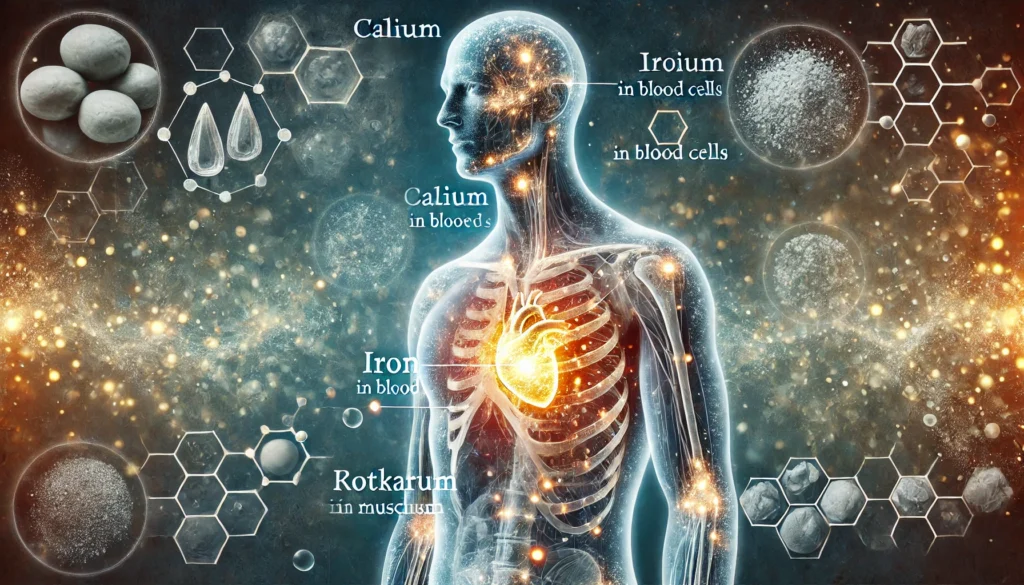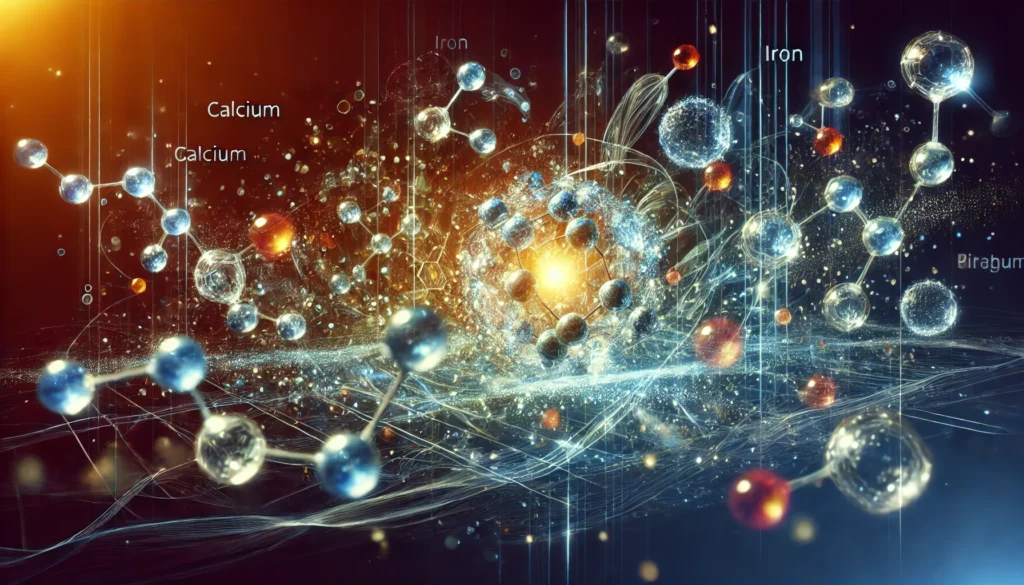Understanding Essential Minerals in Nutrition
Minerals are fundamental to human health, yet they are often overlooked in discussions about diet and nutrition. These essential nutrients play a crucial role in maintaining physiological balance, supporting enzyme function, and facilitating biochemical reactions within the body. Unlike macronutrients such as carbohydrates, proteins, and fats, minerals do not provide energy, but their presence is indispensable for optimal health. Essential minerals for the body include both major and trace minerals, which must be consumed through food or supplements since the body cannot synthesize them.
You may also like: How to Improve Nutrient Absorption: Unlock the Benefits of Bioavailable Nutrients for Holistic Wellness
The role of minerals in nutrition extends far beyond simple bodily maintenance; they actively participate in metabolic processes, support the immune system, and ensure the structural integrity of bones and teeth. Without a sufficient intake of these essential elements, individuals risk deficiencies that can lead to chronic health problems, weakened immunity, and developmental delays. Understanding what minerals do for the body is fundamental to making informed dietary choices that promote long-term well-being.

The Six Major Minerals and Their Importance
The body requires larger amounts of certain minerals, known as major minerals, to function optimally. These six major minerals—calcium, phosphorus, potassium, sodium, magnesium, and sulfur—play distinct and indispensable roles. Each contributes to a specific set of biological functions, and an imbalance in their intake can result in significant health challenges.
Calcium, for instance, is crucial for bone and dental health, muscle contraction, and nerve transmission. A diet lacking in calcium can lead to weakened bones, increasing the risk of osteoporosis. Phosphorus, often found in protein-rich foods, works in conjunction with calcium to fortify bones and teeth while also being vital for energy production. Potassium is instrumental in maintaining fluid balance, muscle function, and nerve signaling, while sodium regulates blood pressure and facilitates muscle contractions. Magnesium supports over 300 enzymatic reactions in the body, contributing to energy production and cardiovascular health. Sulfur, though often overlooked, plays a vital role in protein synthesis and detoxification processes. Consuming a balanced variety of these six major minerals through a well-rounded diet helps sustain overall health and prevents deficiencies.
The Role of Trace Minerals and Their Necessity
While the body requires smaller amounts of trace minerals, they are no less critical to health. These micronutrients, which include iron, zinc, copper, selenium, iodine, manganese, and molybdenum, influence numerous physiological processes. Trace minerals can do what to the body? They contribute to immune function, hormone production, and antioxidant defense, among other essential activities.
Iron is perhaps the most well-known trace mineral, necessary for oxygen transport through hemoglobin in red blood cells. A deficiency in iron can lead to anemia, characterized by fatigue, weakness, and impaired cognitive function. Zinc supports immune function and wound healing, while copper aids in iron metabolism and nerve function. Selenium, an important antioxidant, protects against oxidative stress, and iodine is crucial for thyroid hormone production. Manganese contributes to bone formation and metabolic regulation, while molybdenum assists in detoxification processes. Despite being required in small amounts, these trace minerals are indispensable to health, making it imperative to obtain them through a balanced diet.
Sources of Essential Minerals in Food
Understanding where food minerals are found is key to ensuring adequate intake. Fortunately, nature provides a wide array of foods rich in essential minerals, making it possible to meet daily requirements through diet alone.
Dairy products, leafy greens, and fortified plant-based alternatives serve as excellent sources of calcium. Phosphorus is abundant in meat, fish, nuts, and legumes. Potassium can be found in bananas, sweet potatoes, and leafy greens, while sodium is present in both natural sources, such as celery and beets, and processed foods. Magnesium-rich foods include nuts, seeds, whole grains, and leafy vegetables. Sulfur-containing foods, such as eggs, garlic, onions, and cruciferous vegetables, contribute to protein synthesis and detoxification.
For trace minerals, iron is available in red meat, poultry, fish, lentils, and fortified cereals. Zinc sources include shellfish, beef, pumpkin seeds, and legumes. Copper can be found in nuts, seeds, whole grains, and shellfish. Selenium is prevalent in Brazil nuts, seafood, and eggs. Iodine, critical for thyroid health, is present in seafood, dairy products, and iodized salt. Manganese-rich foods include nuts, whole grains, and leafy greens, while molybdenum is found in legumes, whole grains, and dairy products. Consuming a diverse and nutrient-dense diet ensures adequate mineral intake for overall well-being.
The Risks of Mineral Deficiencies and Overconsumption
While essential minerals contribute significantly to health, both deficiencies and excessive intake can pose risks. Minerals risks eating an imbalanced diet include nutrient deficiencies, toxicity, and related health complications.
Deficiencies can occur due to poor dietary choices, medical conditions, or certain medications. A lack of calcium and phosphorus, for example, can lead to weakened bones and osteoporosis. Insufficient potassium intake may result in muscle weakness, irregular heartbeat, and high blood pressure. Iron deficiency anemia is one of the most common global nutritional disorders, affecting millions worldwide. Similarly, iodine deficiency can lead to thyroid dysfunction and developmental issues in children.
Conversely, excessive mineral consumption can be equally harmful. High sodium intake, for instance, is linked to hypertension and cardiovascular disease. Excess iron can lead to oxidative stress and organ damage, while too much phosphorus can interfere with calcium absorption, leading to bone loss. Maintaining a balanced diet and being mindful of supplementation ensures mineral intake remains within a safe and beneficial range.
The Connection Between Minerals and Hydration
One of the lesser-discussed but vital aspects of mineral intake is its role in fluid balance. Facts about maintaining fluids and minerals in the body highlight how these elements regulate hydration, electrolyte balance, and cellular function. Sodium and potassium are key electrolytes that manage fluid distribution, nerve signaling, and muscle contractions. Calcium and magnesium also contribute to fluid balance by regulating muscle function and nerve impulses. Ensuring adequate hydration, alongside mineral consumption, is essential for maintaining metabolic and physiological stability.

Frequently Asked Questions (FAQ) About Essential Minerals
What do minerals do for the body, and why are they essential? Minerals play an indispensable role in supporting a wide range of physiological functions in the body. They contribute to bone strength, nerve function, and enzyme activation, making them essential for maintaining health. Essential minerals for the body also help in fluid balance, muscle contraction, and metabolic processes that regulate energy production. Without sufficient mineral intake, individuals may experience fatigue, weakened immunity, or even chronic health issues such as osteoporosis and hypertension. The importance of minerals extends beyond physical health, as they also influence cognitive function and emotional well-being.
How many minerals does the body need daily for optimal health? The body requires a total of 16 essential minerals to function properly, categorized into major and trace minerals. The six major minerals—calcium, phosphorus, potassium, sodium, magnesium, and sulfur—are needed in larger quantities to support bone health, cardiovascular function, and fluid balance. Trace minerals, including iron, zinc, copper, iodine, selenium, manganese, and molybdenum, are required in smaller amounts but are no less vital. While some minerals, such as sodium and potassium, are consumed abundantly in modern diets, others, like magnesium and iodine, may require more attention to ensure adequate intake. To achieve optimal health, a well-balanced diet rich in diverse, whole foods is necessary to meet these mineral needs.
Is vitamin C a trace mineral or a major mineral? Vitamin C is neither a major nor a trace mineral; it is a water-soluble vitamin with antioxidant properties. However, it plays a crucial role in mineral absorption, particularly iron. Consuming vitamin C-rich foods alongside iron-containing meals enhances the bioavailability of iron, reducing the risk of deficiency. While vitamin C itself is not a mineral, it supports essential mineral functions by aiding collagen synthesis, wound healing, and immune system defense. To maximize mineral absorption, incorporating vitamin C-rich foods such as citrus fruits, bell peppers, and strawberries into a mineral-rich diet is beneficial.
What are minerals in nutrition, and how do they differ from vitamins? Minerals are inorganic elements that originate from soil and water and are absorbed by plants and animals. Unlike vitamins, which are organic compounds produced by living organisms, minerals cannot be synthesized by the body and must be obtained through diet. Essential minerals for the body include both macrominerals and trace minerals, each playing distinct roles in physiological processes. While vitamins often function as coenzymes in biochemical reactions, minerals act as structural components in bones, teeth, and enzymes. The interdependence of vitamins and minerals highlights the importance of a well-rounded diet to maintain overall health.
Where are food minerals found, and which sources are the best? Food minerals are found in a wide variety of natural sources, including plant-based and animal-derived foods. Dairy products and leafy greens are excellent sources of calcium, while nuts, seeds, and whole grains provide magnesium. Iron-rich foods include red meat, legumes, and fortified cereals, whereas seafood is a primary source of iodine and selenium. To ensure adequate mineral intake, consuming a diverse diet that includes fruits, vegetables, nuts, seeds, dairy, and lean proteins is recommended. Additionally, cooking methods such as steaming and roasting can help preserve the mineral content of foods.
What are the risks of eating too many minerals? While essential minerals support health, excessive intake can lead to toxicity and adverse effects. Minerals risks eating an unbalanced diet include high sodium consumption, which contributes to hypertension, and excess iron, which may cause oxidative stress and organ damage. Overconsumption of phosphorus can interfere with calcium absorption, increasing the risk of bone loss, while excessive magnesium may result in gastrointestinal discomfort. To prevent toxicity, it is important to meet—but not exceed—daily recommended mineral intake levels through whole foods rather than relying heavily on supplements. Moderation and dietary diversity remain key to achieving mineral balance.
Do you need larger amounts of trace minerals, or are small amounts sufficient? Trace minerals, such as zinc, copper, and selenium, are required in small amounts, but their impact on health is significant. Unlike major minerals, which are needed in gram quantities, trace minerals are measured in milligrams or micrograms. Despite their small required intake, deficiencies in trace minerals can lead to serious health issues, including weakened immunity, thyroid disorders, and poor wound healing. It is crucial to include trace mineral-rich foods, such as shellfish, nuts, seeds, and whole grains, in the diet. Since trace minerals can accumulate in the body, maintaining appropriate intake levels is essential to avoid toxicity.
Is sodium a vitamin or a mineral, and how does it affect the body? Sodium is a mineral, not a vitamin, and it plays a crucial role in maintaining fluid balance, nerve function, and muscle contractions. While sodium is essential for health, excessive intake is associated with high blood pressure, cardiovascular disease, and kidney problems. Many processed foods contain high amounts of sodium, making it important to monitor dietary intake. Opting for natural sources of sodium, such as sea salt, celery, and beets, can help maintain balance without exceeding recommended levels. Reducing processed food consumption and staying hydrated also contribute to maintaining a healthy sodium balance.
What are the facts about maintaining fluids and minerals in the body? Maintaining proper hydration and mineral balance is essential for overall health, as minerals like sodium, potassium, and magnesium regulate fluid distribution. Electrolytes help prevent dehydration, support nerve transmission, and ensure muscle function. Drinking enough water is important, but the body also requires minerals to retain and utilize fluids effectively. Imbalances in fluid and mineral levels can lead to symptoms such as muscle cramps, dizziness, and fatigue. Consuming a combination of water, mineral-rich foods, and electrolyte-containing beverages can help maintain optimal hydration levels.
Which 3 good minerals should people focus on for overall health? Three good minerals that are particularly beneficial for overall health are magnesium, potassium, and calcium. Magnesium supports muscle and nerve function, helps regulate blood sugar levels, and plays a role in over 300 enzymatic reactions. Potassium is essential for heart health, as it helps regulate blood pressure and fluid balance. Calcium is critical for strong bones and teeth, as well as for proper muscle function and nerve transmission. Ensuring sufficient intake of these minerals through diet can help prevent chronic conditions such as osteoporosis, hypertension, and muscle weakness. Including foods like leafy greens, nuts, dairy, and legumes can help meet the body’s mineral requirements effectively.

Conclusion: Prioritizing Mineral-Rich Nutrition for Optimal Health
Essential minerals for the body are crucial for sustaining life, supporting metabolic functions, and preventing deficiencies. By understanding what minerals the body needs and how to obtain them naturally, individuals can take proactive steps to enhance their health. A well-balanced diet rich in mineral-dense foods ensures the body receives the necessary nutrients to function optimally.
Incorporating a variety of whole foods, monitoring mineral intake, and staying hydrated contribute to overall well-being. Whether through dietary sources or mindful supplementation, prioritizing mineral intake is a fundamental aspect of holistic nutrition. Recognizing the importance of minerals in everyday health choices empowers individuals to maintain vitality and long-term wellness.
essential minerals for the body, what minerals does the body need, minerals can do what to the body, food minerals are found in, six major minerals foods, iron sodium calcium phosphorus and potassium of minerals, how many minerals does the body need, five food minerals, minerals risks eating, facts about maintaining fluids and minerals in the body
Further Reading:
The Role of Minerals in the Optimal Functioning of the Immune System
Precious metals and other important minerals for health
Disclaimer
The information contained in this article is provided for general informational purposes only and is not intended to serve as medical, legal, or professional advice. While NewsHealthWatch strives to present accurate, up-to-date, and reliable content, no warranty or guarantee, expressed or implied, is made regarding the completeness, accuracy, or adequacy of the information provided. Readers are strongly advised to seek the guidance of a qualified healthcare provider or other relevant professionals before acting on any information contained in this article. NewsHealthWatch, its authors, editors, and contributors expressly disclaim any liability for any damages, losses, or consequences arising directly or indirectly from the use, interpretation, or reliance on any information presented herein. The views and opinions

